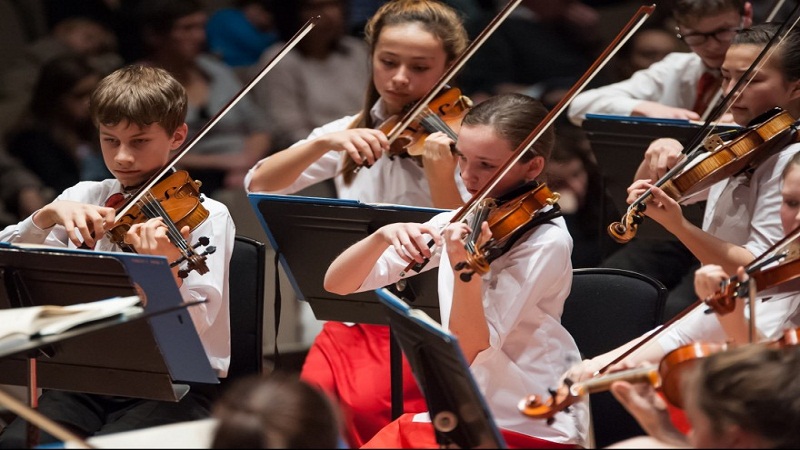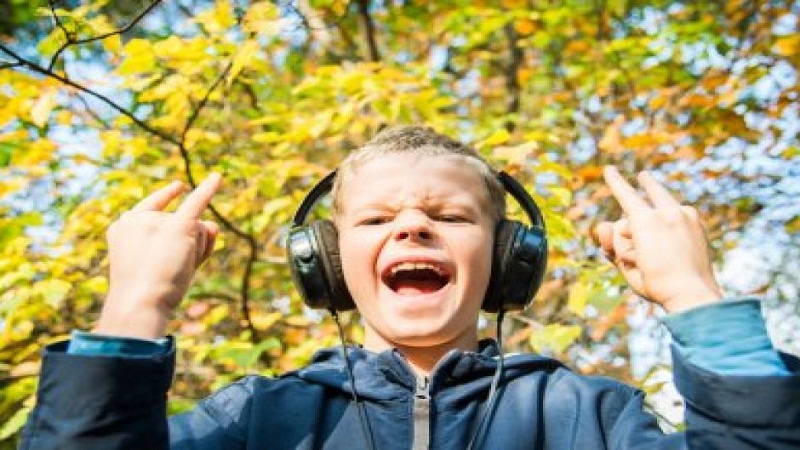The influence of music on the health of children and the harmonious development of the personality has been known since ancient times. That’s why many parents pay attention to the musical education of their children at different stages of their development.
How does the influence of music affect the intrauterine development of a child
Many peoples paid attention to the intrauterine development of the child, using for this collective singing. In the Chinese folk tradition, it is believed that the mother by means of singing creates a child’s soul. In the north of Europe, there was a tradition of singing lullabies during the prenatal period. People’s beliefs about the positive impact of music on the development of the fetus are confirmed by numerous studies of modern scientists – it is known that the baby is active while listening to music by the mother already on the 20th week of intrauterine development. To hear the sounds of music the child begins even earlier – by the end of the 16th week of pregnancy. Studies have shown that music can affect the baby’s body, as the fetus has changed:
- respiratory rate;
- intestinal motility;
- muscle tone.
The most distinct, familiar and pleasant for the child in the womb are the sounds of the mother’s voice. The baby during intrauterine development becomes so accustomed to them that after birth, unmistakably recognizes the voice of the mother and immediately calms down with familiar sounds. That’s why in ancient times pregnant women sang lullabies. Read more: Skincare for people over 60 years
Thanks to the experiments it became known that the works of Mozart, Vivaldi, and Tchaikovsky act on the fruit soothing, and Beethoven and Bach – increase the activity of the child. Negatively affects the baby rock music. Statistics state that children who have often listened to rock before birth are more violent, excitable and aggressive. Read more:
Also, experiments have shown that:
- the coefficient of intelligence is higher for toddlers who in utero listened to Mozart’s symphonies;
- listening in the prenatal period of music accelerates the development of speech functions;
- children in the prenatal period are better able to catch deep low sounds so the lullaby can be sung by the father.
If neither Mom nor Dad can sing, you can use professional records. When using records, you must:
- include music after sleep and before bedtime;
- the music session should not exceed 40 minutes;
- music should not be loud;
- If you attach the headphones to your stomach, you should turn off the low frequencies.
- the pregnant girl listens to music
In addition, it is important to monitor the reaction of the baby – if the child begins to behave very actively, try changing the repertoire.
After the birth of the baby, including the same songs for listening, and you will see how when playing a familiar melody the baby will calm down and fall asleep more quickly.
Music influences not only the intrauterine development of the child but also its further mental and physical health.
The influence of music on the mental development of children
Music for centuries has been used as an element of the educational process and as an attribute of culture, through which adults have tried to instill in children the concept of harmony and beauty. However, thanks to technology and the current pace of life, children do not get enough attention from adults.
Circle of communication among modern children is limited, which is largely facilitated by the availability of television and computers. Children are often unable to cope with the neuropsychological stresses that they receive in kindergartens and schools.
As a result, an increasing number of children suffer from various psychosomatic diseases, hyperactivity and various forms of behavioral abnormalities. In connection with the official recognition of music as a curative and increasing the number of children in need of medical care, the attention of researchers has attracted the aspect of the influence of music on the health of children. The most common use of music therapy as a therapeutic and educational method.
Music in such cases is an invaluable assistant. Methods and methods of music therapy help to shape the emotional sphere of the child and normalize the psyche of children. Thanks to stimulation of the left temporal lobe, the music is used for:
- improve oral memory;
- development of speech;
- the concentration of attention;
- removal of mental stress;
- the development of logical thinking.
Children seriously engaged in music noted the development of mathematical abilities. Playing musical instruments contributes to the development of fine motor skills. Scientific evidence confirms the dependence of good speech, intellect, creative thinking and memory on the dexterity of fingers. In addition, music classes influence the emotions-related right hemisphere of the brain. Children get a charge of positive emotions, are able to empathize and understand themselves and their mood.
Influence of singing on children’s health
The indicator of human health, some scientists believe the voice – a person with sound health is sonorous and strong. That’s why it’s useful not only to play musical instruments but also to sing. Even if the child has no voice and hearing to become a good singer, singing will help:
- to develop breathing, which is important for children prone to diseases of the respiratory system;
- To instill a good posture due to the correct position of the body during singing. As most modern children spend the whole day at a desk, in front of a computer and a TV, the problem with posture is typical for many teenagers.
In addition, when a person sings certain sounds, certain organs are stimulated. It is useful to sing vowels:
- the sound “A” relieves spasms and affects the activity of the heart and gallbladder;
- the sound of “E” helps to improve the work of the brain;
- the sound “I” is used for diseases of the eyes, ears, and nose;
- the sound “O” stimulates the activity of the pancreas and the cardiovascular system;
- the sound “U” normalizes breathing, the work of the kidneys and the genitourinary system;
- the sound “Y” improves breathing and is useful in problems with hearing.
Singing exercises stimulate the child’s interest in his own “I”, therefore contribute to the formation of a harmonious and mentally healthy person. Any music classes have a positive effect on the overall health of children.
How music affects the physical health of children
Listening to classical music is recommended for children who suffered from a lack of oxygen during fetal development. Lack of oxygen causes a decreased activity of cellular enzymes, regardless of whether a full-term baby was born or not. Cytochemical analysis, measurement of pulse, blood pressure and rhythm of breathing showed that the baby’s organism is better adapted to the environment under the influence of classical music. In children with various neurologic disorders after a year of music therapy, significant improvements in health status are noted.
Music therapy is also used for such abnormalities as:
- increased feelings of anxiety and insecurity;
- headaches caused by emotional stress;
- decreased body tone;
- oppression syndrome, decreased appetite, arrhythmic breathing.
Music is also used to treat children with disabilities. Thus, the use of kantele (Karelian folk stringed instrument) gives a positive effect in the treatment of children with mental retardation, infantile cerebral palsy and poor eyesight.
Despite the harmless use of music for medical purposes, there are contraindications. Music therapy does not apply to children:
- predisposed to convulsions;
- with otitis;
- with severe diseases, accompanied by the intoxication of the body;
- with a sharp increase in intracranial pressure.
What music is best used for medical purposes
Studies have shown that classical music is most conducive to children’s health. The most healing musical compositions are the compositions of Wolfgang Amadeus Mozart. His works are recommended for children:
- with increased excitability;
- characterized by hysterical behavior;
- prone to whims.
To obtain the therapeutic effect, music therapy sessions for young children should last for 20 to 30 minutes a day. Children have a more adequate and balanced behavior within a week. In addition, regular listening to Mozart stimulates intellectual development.
For excitable kids, Vivaldi’s music, various lullabies and any other musical works at a slow pace are also useful.
For children with irregular breathing, a syndrome of oppression and poor appetite, works are recommended at the rate of “allegro moderato” and “Allegro” (Mozart, Schubert, Haydn, etc.).
Parents need to remember that rock music is harmful to young children because of a pronounced pulsating rhythm. Although outwardly the child can behave calmly, the pulsating rhythm depresses the cellular enzymes.
You should also take into account the simple rules of music therapy:
- music should not be loud – sharp loud sounds can cause anxiety of the kid;
- it is recommended to include music in the morning and before bedtime;
- the children are more influenced by melodies with words, and the most effective means is live singing.
Depending on the age and existing health problems for each kid, you can choose the melodies that will help the child not only to harmoniously develop but also to feel good.
It may like also: http://www.npoblogs.net/dark-bruises/




